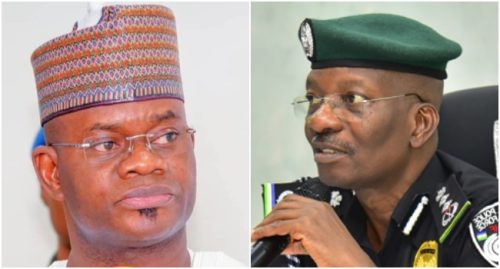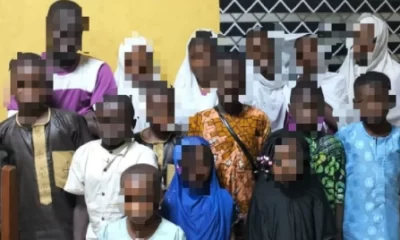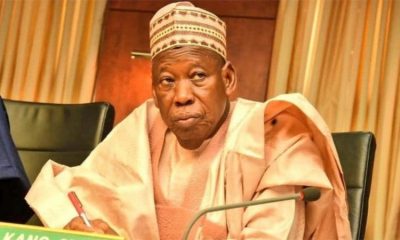News
Zamfara Govt Speaks About Abduction Of Over 300 Schoogirls

The Zamfara State Government has confirmed the abduction of female students of Government Girls Secondary School, Jangebe in Talata-Mafara Local Government Area of the state.
In a brief interview with newsmen in Gusau on Friday morning, Commissioner of Security and Home Affairs, Alhaji Abubakar Dauran, said the abductors invaded the town and took away the students at about 2am.
He said: “I can confirm to you now that we have sadly received the report on the abduction of the students of GGSS Jangebe and right now, I am on my way to the school.
“At this moment, l cannot say how many students were taken away by the gunmen until l get there, but we have already mobilized security men and members of the vigilantatè who are now in pursuit of the abductors.”
Reacting to the kidnap, a staff of the school who spoke on condition of anonymity said, “The gunmen in their hundreds invaded the town around 2 am on Friday, shot sporadically in the air to scare the residents before coming into the school.
“After taking away most of the students, we rounded up those that escaped or hid from the bandits and conducted a census where we counted 54 students and we are still searching to see if we can get more.”
This is coming a week after gunmen invaded and kidnapped students and staff of Government Science College, Kagara, Niger State.
News
Alleged Obstruction: Police Detain Yahaya Bello’s ADC, Security Details

The police have detained a female police officer who was the aide-de-camp to the embattled former Kogi State Governor, Mr Yahaya Bello, over allegations of being part of the security aides that obstructed the arrest of the former governor in Abuja.
The ADC was arrested alongside other police officers attached to Mr Bello. They are being detained at the State Criminal Investigation Department in Abuja.
Sources within the Police say their arrests and detention followed an order by the Inspector General of Police, Olukayode Egbetokun, directing their immediate withdrawal from the former governor.
The source who spoke to our correspondent on the condition of anonymity explained that the officers were arrested on the suspicion that they deliberately aided and abetted Bello’s escape from operatives of the Economic and Financial Crimes Commission, who had gone to effect his arrest at his Abuja home on Wednesday.
The Inspector-General of Police had on Thursday ordered the withdrawal of all police officers attached to Mr Bello.
The Nigeria Immigration Service has also placed Mr Bello on its watchlist for conspiracy, breach of trust, and money laundering.
The Assistant Comptroller General of Immigrations signed the document and copied the Nigeria Customs Service, the Inspector General of Police, the Director General of the Department of State Services, and the Director of the National Internet Agency.
News
IMF: Why We Asked Nigeria To Remove Fuel Subsidy
And what’s the reason why we counsel against such generalised subsidies is very simple. It tends to be highly regressive, meaning the benefits of such you know, fuel subsidies tend to accrue to the rich and segments to reach out to people and the poor people.

The International Monetary Fund (IMF) has explained why it advised Nigeria to remove fuel subsidies, adding that the subsidy regime was robbing the poor for the rich.
The Director of the African Department of the Fund, Mr. Abebe Selassie, provided insights into the organisation’s position, at the ongoing Spring Meetings of the IMF and World Bank in Washington DC. According to him, the Fund had provided robust content and how the poor could benefit from the policy in the provision of social safety nets.
His words: “Subsidies are about resource allocation internally within Nigeria. So Nigerians, the people of Nigeria pay for these subsidies.
“And what’s the reason why we counsel against such generalised subsidies is very simple. It tends to be highly regressive, meaning the benefits of such you know, fuel subsidies tend to accrue to the rich and segments to reach out to people and the poor people.
“So it’s people that are driving these large cars, with big houses are wanting to see subsidised fuel. They’re the ones benefiting relative to the poor and vulnerable in Nigeria.
“So you know, not only people paying for the subsidies Nigeria, it’s the poorest segments of society that actually are losing out and resources could instead, of course, be used to improve conditions for poorer people instead of accruing to rich people.
“That’s why subsidy reform is important. We applaud the government for the steps government took to reduce the extent of subsidies. I think as oil prices have become volatile, the level of subsidy has also moved up and down. “But I think you know, the direction of travel, I think, to remove the subsidies and use the resources to provide social protection for the most vulnerable households.”
Mr. Selassie revealed that the IMF has provided the sum of $58 billion to African countries since the outbreak of the COVID-19 pandemic and pledged it would do more.
The IMF chief cautioned African countries against commercial loans for the purposes of refinancing because of the current rate hike in most economies.
He advised that instead, countries South of the Sahara that have debt service challenges should look inward for domestic resource mobilization, which would be easier to deal with. The Director criticised the practice of discriminatory tax exemption to some companies and not extended to others.
These special favours to some companies, he observed reduce the effectiveness of governments to optimise tax revenue..
Positive developments in Africa
“Mr. Abebe said that after four challenging years and multiple shocks, Sub-Saharan Africa’s economy appears to be on the mend.
“We expect economic growth to rise to 3.8 per cent in 2024, from 3.4 per cent last year. After peaking at almost 10 per cent in late 2022, inflation has nearly halved to around 6 per cent in the early part of the year thanks to decisive action by central banks.
“This includes slower food price increases, a positive development for a region where the cost of crises has been acute in recent years. In addition, fiscal consolidation efforts are starting to pay off, with the median public debt stabilizing at around 60 per cent of GDP, halting a 10-year upward trend.
“And with global financial conditions easing, a few countries have been able to return to international markets, ending a two-year hiatus. These are encouraging signs.”
The Missing Chief said, however, “ the region is not out of the woods yet. Far too many countries still face a funding squeeze.
What’s heart breaking about Africa- IMF MD
Also, IMF Managing Director, Mr. Kristalina Georgieva, described as “heart-breaking”, the situation in which African countries spend large amounts of their revenue on debt servicing.
Her words, “African countries spend on average, 12 percent of their revenue on on debt servicing. This is more than double from the Las decade. They were at 5 percent a decade ago.
“What is heartbreaking is that in some countries, the debt payments is up to 20 per cent of revenues.
“What does that mean? It means that what could have gone to education, health, for investments in infrastructure and jobs is being sucked away by debt servicing. The ground for public capital to come in.
“We know that part of the reason is that interest rates are quite high. So what does it translate into for authorities in Sub-Sahara Africa?
“First, we see that those who have worked on public finances, to clean clean the ground for private capital to come in are doing better.
“When you have a tax/revenue of 26 per cent like Cote d-Ivoire, you can bear the debt burden. When you 12 per cent to GDP you cannot.”
The MD said that the IMF’ major peg of interaction with member countries in the region was focusing on the mobilisation of domestic resources, improving public spending and mobilising local savings with which to achieve growth prospects.
She added that African countries must keep their eyes on inflation because that problem remains unsolved.
Ms. Georgieva noted that Africa was blessed with huge potential, with huge a youth population that was earger to work and that its leaders should allow Africa’s resources to work for Africans.
News
Ganduje Remains Our National Chairman – APC

The All Progressives Congress, APC, says the former governor of Kano State, Abdullahi Ganduje remains its national chairman.
The National Publicity Secretary of Felix Morka stated this in an interview on Arise Television on Thursday.
Morka said the ruling party will not honour the initial court order affirming Ganduje’s suspension as national chairman.
He said the national chairman of the party has not been served any summon concerning the initial court order restraining him.
Morka noted that the party has thrown its weight behind the recent Kano Federal High Court ruling calling for a stay of the order.
Recall that the political drama in Kano took a fresh twist on Wednesday after a Federal High Court presided over by another judge, Justice A.M Liman, halted the purported suspension of Ganduje by his ward executives in Dawakin Tofa Local Government area of the state.
The ruling was given after Ganduje filed an exparte motion seeking to enforce his fundamental right to a fair hearing.
The respondents in the application are the Nigerian Police, Department of State Services, Nigeria Security and Civil Defence Corps and nine other individuals.
Reacting to the development, Morka said it was the right thing to do on the basis that those who masterminded the suspension were not recognised members of the party.
He said, “The order issued by the first court was very disturbing, for some reasons. First, the plaintiffs who purportedly filed that action are not recognised members of our party and therefore shouldn’t have the locus standi to invoke the authority of the court to make any such order.
“Secondly, every lawyer in this country is aware that from the Supreme Court up to the NJC, there is this cautiousness that judges don’t make orders that are far-reaching in effect on an exparte motion or application.
“When you see the nature of the case and observe it is likely to cause the defendant substantial exposure to ridicule and justice, you put that defendant on notice within the context of even that exparte application; so that the justice of the matter can be met.
“But this judge, in this case upheld the illegal suspension of a national chairman, did so on an ex parte application, which shouldn’t really be.
“Being a lawyer, I have a lot of respect for the court and won’t say much. But be that as it may, as I speak, that order of the Kano State High Court purportedly affirming the suspension of our national chairman has not been served on the party and the national chairman himself.
“So this conversation and every other one relating to this has really been based on media reports. In other words, we do not have legal notice of that order. So the question of how we react to it or whether we will respect it or not is out of it because we have not been served.
“In the meantime, this Federal Court has issued a prohibition, an order restraining the impersonators who are the plaintiffs in that matter from enforcing that suspension.
“We are right now in the stage of status quo where we were before the purported suspension of Ganduje as the national chairman. He still remains our national chairman.”
-

 News2 days ago
News2 days agoHeritage Bank In Crisis! Shut Down Over Mass Sack, Undue Process
-

 News2 days ago
News2 days agoJust In: EFCC Threatens To Involve Military In Arresting Yahaya Bello
-

 News23 hours ago
News23 hours agoLagos Police Arrest Driver For Cramming 15 Children Inside Car
-

 News2 days ago
News2 days agoKano Court Reverses Ganduje’s Suspension, Orders Status Quo
-

 News2 days ago
News2 days agoMoney Laundering: EFCC Declares Kogi Ex-Gov, Yahaya Bello Wanted
-

 Breaking News1 day ago
Breaking News1 day agoJust In: IGP Withdraws Policemen Attached To Embattled Ex-Gov Bello
-

 News1 day ago
News1 day agoN80bn Money Laundering: FG Places Ex-Kogi Governor, Yahaya Bello On Watchlist
-

 News1 day ago
News1 day agoAPC Asks Police To Arrest Impostors Who Suspended Ganduje















